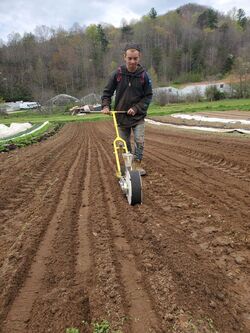|
 Many moons ago, when I was in college, my friend Kevin and I decided to go to the County Fair. We ate junk food, rode rides, played some carnival games, and laughed a lot. Turns out, for reasons I cannot recall, Kevin had a gift certificate (??) for a free palm reading with a psychic who had a booth at the fair. He didn’t want to use it, but I wanted to continue the fun and so I went in to see her. She set the mood with her beads and crystals and deep smokey voice. She asked me if I had any burning questions. My reply was meant to catch her off guard, which, as you might have predicted, is difficult to do to a psychic, and was evidenced by her smooth reply, “you just need balance in your life.” “But-“I protested, still wanting to throw her off her performance “-Balance.” She cut me off (She was good!) Well, as generic predictions and advice tend to do, this has become a theme in my life and a reason I even remember this non-event meant just for fun so long ago. You see, it wasn’t until several years later, after Jason and I had wandered into each other’s lives and seemed to have stuck, that I learned that Jason’s Appalachian Trail name is (did you guess it?): Balance. (insert audible “aaawww” here) But that was not to be the end of this generic prediction, oh no! This comes around in varying frequencies. In middle age, the balance challenge has been between living for today since no one is guaranteed tomorrow, and planning for tomorrow in case you get to have one. In a physical labor career, I don’t think I can work until I’m 85, so I had better make at lease some allocation for tomorrow just in case I get there. I don’t have it perfected, by any means, but this has been the balance occupation of the last several years. Then, enter election cycle as they are wont to do. And so, for the rest of the year, I must struggle to obtain the balance between sanity (no news is good news!), and staying engaged enough to make informed decisions in a few months. This balance challenge is a doozy! It feels a bit like walking a tight rope over the precipice of doom and I wobble a lot. Hopefully, my harnesses of joy and human connection can keep me from falling into that deep dark pit of despair, but I had better reinforce them when I can in case I lose my balance I’ve been seeking since I walked out of that carnival tent all those years ago.
0 Comments
 When you get behind and begin the triage, (which always seems to happen in June/July on the farm) you start to ignore the periphery. But the periphery, like a child building a sand castle, grows over time until eventually it’s so impressed with itself that it starts to stomp around and scream “look at me! Look at me! Look at me!” And you can no longer blind yourself to it. The recycling begins to overflow. The collapsed shelf begins to hinder the obtainment of supplies. The trailer of trash is towering. The piles of piles taunt you to near insanity. It is then that you re-prioritize the periphery to the forefront. You clean up your space a bit; take care of those little things that have been quietly nagging at you even though none of them appear to help you earn your living. Because sometimes, sanity becomes the priority. And when it does, it turns out that sanity does help you make your living. At least it throws some semblance of organization to the chaos. Which can be exactly how farm life feels in July. Like you keep waking up to yet another Friday harvest day before that “stupid o’clock alarm” for Saturday markets. Like it’s groundhog day but every Friday is a little bit different, you just don’t remember how you got to yet another Friday so quickly. No matter how many times you just put one foot in front of the other with your head down, the weeds always move faster. Everything always moves faster. And the periphery is building again and you know it but you just can’t look at it yet. Not until you get a little bit closer to insanity. Then you’ll re-prioritize again.  No matter your news source, the news is bad. Really, news is inherently bad. I mean, what’s newsworthy of nothing happened today? That’s just the nature of the news beast. But that doesn’t mean we as individuals, can’t inspect the cracks for levity and joy. In fact, I propose that it is our duty to do so. We must maintain a side hustle in delight. To fail to do so is to besmirch our own human capacity for mirth. It is to play the victim. It is to wallow. Don’t get me wrong: I myself, have dabbled a bit in these dark acts. It is rather easy to find oneself on that well-worn path of despair. It is for this exact reason that we must accept the assignment of joy. This is no small mission, my friends, but I know we are up to the task. It requires concentration and effort and seeking. You might, at first, sweat and grunt with the work of it, bowing under the weight of the impossibility of this mission. But find that first delight (a child’s giggle, a bird’s morning tune, a gurgling creek, a snapdragon in the crack of a sidewalk, the relief of a cloud on a hot day), and the second becomes a slight bit easier to find. Until, suddenly, you find yourself skipping amongst the clouds, enveloped in joy. This is not to say that we should ignore the problems of the world around us. No, this is distinctly our side hustle. But it is precisely this side hustle that better arms us to tackle the problems of the world around us. Without joy, we only exacerbate the problems. We only throw more darkness on the despair with our useless complaints because without delight, what exactly is worth saving? What is worth repairing? So soldier on, my comrades in arms against despair. Let us find our joy and then fight to preserve it. Once we find our own, we will spread this contagion to the rest of the world and our levity will better lift those imposing boulders of darkness that pin our brethren down.  If every season must have a disaster, then we have arrived at this season’s disaster. While we were all away working farmers markets on Saturday, we had a day long power outage that ceased the operation of the tomato/cucumber greenhouse ventilation during a heat wave. The greenhouse proceeded to heat up to 140 degrees, which, as it turns out, is simply too hot for tomatoes and cucumbers. I’ve surveyed the wasteland. It’s a total loss. “Well,” Jason says with a shrug of his shoulder, “that’s twenty five hours of labor we get to spend on other things.” I let the loss wash over me. I double over with it. I’m not ready for the silver lining yet. It’s been a rough week full of complicated and intense human psychology and emotion that I found myself to be unprepared and unqualified to handle. This, though, this is farming. This is my familiar. Disaster. Scrambling. Recovery. Twenty years and we’re somehow still kicking this same dirt around. Okay. I shrug my shoulders. Bring me the silver lining now. It's there, of course. It always is. But sometimes it takes a little digging through the rubble to get to it. So after I picked myself up from the sucker punch and dusted myself off, I could see that Jason was right: the field tomatoes and cucumbers will get all the love they need now, we’ll catch up on things we never imagined getting to, and, perhaps, we even manage to kill any disease or insect build up in that greenhouse to better future production. See? I can do it too! I’m not saying this isn’t going to hurt for a long time, but, if you look hard enough, you can start to see the little sparkle of silver amongst the wreckage.  Sometimes the rest of the world, or at least certain people in it, can feel very far away from things we understand. A friend told me the other day that they have started with the very basic commonalities in others such as, “we’ve all got hair!” I remembered this the other day while standing in line at the bank on a Monday afternoon, observing all of our costumes. Mondays at the bank are interesting in this way: we all wear our occupations, um, “on our sleeves” so to speak. There was the man in front of me in a crisp white shirt and black dress slacks, and the woman in front of in front of him in her comfy supportive shoes and food service apron still clinging to her waist. There was the woman in scrubs and orthopedic shoes, and the man with his mechanic’s coveralls embroidered with the name of the shop, and there was me in dirty jeans and work boots. There we were, from all sorts of different occupations (and perhaps walks of life), with this mundane task in common. We all need to go to the bank (assuming we don’t just stick cash in a mattress). I didn’t know any of these people standing in line with me at the bank, but I knew, at the very basic level, that we all had this one thing in common: we needed to go to the bank. And even that can be a starting point of connection in a world that can feel so far away.  There is an old Ani DiFranco song lyric: “the butter melts out of habit, the toast isn’t even warm”, that’s been playing on repeat in my head since last Wednesday. Wednesdays are one of the wake-up-at-stupid-o’clock-go-go-go long days that begin early and end late. And I am rarely the best iteration of myself on those mornings, at least pre-coffee. But I’ve been practicing. Not practicing the wake-up-at-stupid-o’clock so much (I try to avoid that as much as possible), but practicing training my brain. I heard someone put it this way the other day: our thoughts/reactions are like water wearing a path through the limestone-they create easy pathways for automatic reactions, for habits. But we can build a dam in those pathways and force the water to forge an alternate path. This is what I’ve been practicing. And Wednesday, I noticed the practice paying off (which is good because I can get lazy about practice, just ask my mom about those seven years of piano lessons). I gathered all my supplies for the long day, including my travel mug full of hot coffee. As I was headed out the door, I noticed my back feeling very warm and realized that the travel mug lid was open and almost all the coffee had spilled out in my bag. The automatic “woe-is-me, this is how this day is going to go” reaction kicked in followed by Jason’s “let me take care of it” reaction, but I noticed my heart just really wasn’t in it. The alternate route for the water was forged just enough so that not all of the water was running through the “woe-is-me” route. Just enough so that even though my body was acting out of habit (big sigh), underneath that auto-pilot reaction, it just didn’t feel like that big of a deal. Which it wasn’t, of course, but that hasn’t historically stopped me from acting like it was—like the world was somehow out to get me as evidenced by this early morning coffee spill. This is the beauty of middle age. I’ll never understand the obsession with youth in this culture. I find the most joy in middle age, when I’ve had time and experience enough to learn that I have control over my own experience. Perhaps some folks find this enlightenment earlier in life, but I was not one of those people. And so I find myself enjoying middle age immensely, and only looking forward to the next phase, where I suspect even more joy awaits.  I made a point a few years ago to prioritize fun. If anyone asks, I’ll maintain that this is a very good idea. The only problem is that by prioritizing fun doesn’t always mean that something less fun has to go away. Not that farming is not fun, it definitely is, but it’s still work, and it has a seasonal ebb and flow. Spring is a giant ebb. It demands “ultra” full time (like an “ultra marathon”) including early mornings and late evenings and all the running in between. But I don’t want to kick out fun, so I power through like a proper dictator: “you WILL do this and it WILL be fun!” In that spirit, I’ve been flying through the last month. You may have noticed (I hope you noticed, but you probably didn’t and there’s no need to tell me about that😊), that there has been no blog in the last two weeks. I’ve been running around chasing fun while still cramming in ultra full time farm work. I had no plans to end this insanity this weekend, but accidental fate intervened. You see, I spent a long “lunch” after market on Saturday reconnecting with my closest friends, then drove home, set an alarm to get up to chase the borealis with some friends, looked at river levels and picked one to paddle the next day, texted paddling friends to arrange it, and took a “quick nap”. My alarm went off at 9:30, I got up to find the address where we were to meet our friends for sky gazing and there were no texts. Nor was there a text from our paddling friends about paddling the next day. So I rolled over and went back to sleep for the night. The next morning greeted me with continued radio silence and we decided to rest, relax, and do very little on Sunday instead of driving 4 plus hours to find enough water to paddle. I discovered somewhere mid-morning, when it was too late to get any real coordination of paddling in motion, that I had accidentally turned my phone on airplane mode. So the “radio silence” was actually just an accidental intervention of fate, or subconscious, or whatever-you-want-to-call-it. But I will tell you now: it was exactly what my body needed after two weeks of non-stop. I feel quite rested now, thank you, and the grass is mowed and the laundry washed and put away, and the house, well, relatively cleanish. And I’m ready for the next round of non-stop.  This weekend at the main season opening of the Hickory Farmers Market, a dad bought an armful of irises from which his young children plucked stems one by one and ran around giving them to people—mostly strangers. The young son, at one point, said something to his dad that I didn’t catch, to which his dad replied, “I know buddy, that’s why we’re out here practicing.” There was a man walking briskly through market alone. He was dressed in black jeans and boots and a black t-shirt that exposed his heavily tattooed arms, his ballcap pulled low. In some eras, we might have said he looked “tough”. But the young daughter stopped him in his tracks to hand him the flower she was holding and complimented one of his tattoos. Flabbergasted and smiling wide despite himself, he thanked her and ambled just a bit more slowly, with his head held just a bit higher, through the rest of the market. I can imagine all sorts of lessons that father with the flowers was hoping to teach his children, but I wonder if he understood the lesson they were teaching us: to remember to practice kindness. That kindness does not have to be big, or expensive, or even inconvenient. That it’s the tiny little kindnesses that hold us up in this world. A nod, a smile, just holding the door. I mean, pretty much everyone is perfectly capable of opening doors on our own, but we stop anyway to hold the door for the next person, no matter who they are, to signify kindness. To say, “I see you, fellow human, making your way in this world, and I am going to do this small thing to make that way just the tiniest bit easier for you because I, too, am human.” If you zoom out, you see the conglomeration of all those tiny little kindnesses. You see us recognizing and acknowledging our common humanity in each other. And so, when you find yourself at the brink of losing faith in that humanity, remember those children handing out flowers to strangers, quietly making a stranger’s day just a little bit brighter. Remember to notice the tiny little kindnesses that surround us as we move through the world. And then remember to practice.  I never really noticed the Carolina Jessamine, despite its abundance, until a friend gave me the name. Suddenly, I was aware of every one, thousands of them. They had been there all along, of course, but unnamed things are easy to ignore. It is for this that I gather names. I do not wish to walk blindly through the world around me, never pausing to consider the anonymous life around me. Names are like a magical pair of eye glasses that bring a sudden focus. I can see at last! I want to exclaim. And behold! The wonders around me that I, presumably, have been missing all along. This is universal, I believe. By which I mean, it is not just for plants. For example, I once had never heard of Kratom. Then, a friend-a recovering heroin addict-explained its use in recovery to me, and suddenly, I began to see “Kratom” advertised ubiquitously. It had been this way for a long while, of course, but my ignorance of such made me blind to it. I suppose the same must be true of people, as well. I am a strong believer in name tags, especially in service establishments. This allows me to suddenly see “Clarissa” or “Josue” instead of blindly checking out my groceries without even noticing an actual person there (don’t even get me started on self-checkout!). And once I know Clarissa as a person rather than just the cashier, it’s likely that I’ll see her in other capacities in the community. You know, a human with an actual life beyond her job at the grocery store. And so, I go about gathering names these days. Trying to move slowly enough to discern the world around me, to keep the magical spectacles in place.  Spring is a big dance floor. Each of us moving in our own orbits, frenetic. For this moment it feels wild, chaotic, raucous, but the years have taught me the choreography of the whole. That each frenzy is but cog in the machine that is a farm. So much to be done by these sixteen hands, here, there, together, apart. Let your eyes glaze and the inchoate solidifies like a stereogram-the method to the madness, coaxing life from the ground up. From seeds one hand has sown, another transplanted, another cultivated, and yet another tended and harvested, another washed, and another eaten. This is what fuels our dancing. Each step, one in front of the other, sometimes mine, sometimes yours, to arrive again at the beginning. It is a nourishing thing, the growing of food. In both the obvious and obscure way. We come again each season, like wildlife to water, awakening to the dance of spring. |
AuthorWrite something about yourself. No need to be fancy, just an overview. Archives
July 2024
Categories |

 RSS Feed
RSS Feed